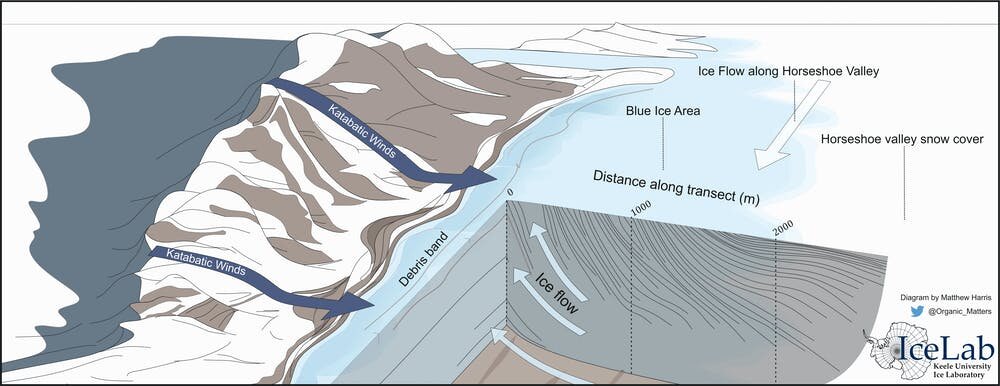Professors Chris Fogwill and Chris Turney are in the news again, with a new study that highlights the crucial role that Antarctic sea ice plays in controlling global CO² levels.
ARC Linkage Research Project
ALE has a long association with the duo, providing logistic and financial support for fieldwork focused on changes in ice sheet dynamics. In 2010, the researchers used mountains protruding through the ice sheet as “dipsticks” of past changes in ice sheet thickness and volume. In 2012, they began a five-season project on Integrating Past Ice Sheet Dynamics with Palaeoclimate Estimates. The project was jointly funded by the Australian Research Council (ARC) and ALE and focused on collecting ‘horizontal’ ice cores from the blue-ice areas at Patriot Hills. Blue-ice occurs where strong, turbulent winds remove surface ice in a process known as ablation. This draws ancient, compressed layers up from below, providing access to a detailed record of past climate change preserved in millennia-old ice. Analysis of the ice cores resulted in a high-resolution record extending back tens of thousands of years.
 A walk across the blue ice is a walk back in time. Credit: Matthew Harris, Keele University
A walk across the blue ice is a walk back in time. Credit: Matthew Harris, Keele University
Further Analysis Reveals Important Links
Fogwill and Turney partnered with an international team to conduct further analysis of the cores. They looked for organic biomarkers and DNA from the Southern Ocean, that had been preserved in the ice, and used climate modeling to better understand what they were seeing. Their results, which were published in the July issue of Nature Geoscience, suggest that during a time of past global warming, changes to seasonal sea ice extent resulted in enhanced marine productivity in the Southern Ocean, drawing down atmospheric carbon and storing it in the deep ocean. A post by Chris Turney on phys.org, the science and technology news site, provides a very readable summary of the project and its implications.
The observation that seasonal Southern Ocean sea ice feedbacks may have contributed to enhanced carbon sequestration, has important implications for our understanding of the role of the Southern Ocean in global carbon dynamics and the development of future climate change models.
ALE is proud to support groundbreaking, Antarctic science such as this and looks forward to future collaboration with Professors Fogwill and Turney.
Read more about blue-ice coring at Patriot Hills
Read more about ALE’s support of Antarctic Science
phys.org/news/2020-07-marine-life-ancient-antarctica-ice
phys.org/news/2020-06-role-sea-ice-atmospheric-carbon